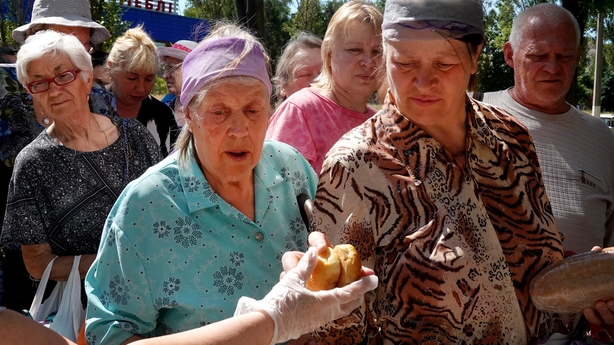The European Commission will provide a clear signal next week on Ukraine's EU candidate status bid, its chief Ursula von der Leyen said today
Making a surprise visit to Kyiv, Ms von der Leyen said talks she held with Ukrainian President Volodymyr Zelensky "will enable us to finalise our assessment by the end of next week".
This is the first time the European Union bloc has publicly given a timing.
Mr Zelensky has been pressing for rapid admission into the EU as a way of reducing Ukraine's geopolitical vulnerability, which was brutally exposed by Russia's 24 February invasion.
But officials and leaders in the bloc caution that, even with candidacy status, actual EU membership could take years or even decades.
Ms Von der Leyen, appearing alongside President Zelensky during her second visit to Kyiv since the war began, did not hold out any promises, noting further reforms were needed.
The Ukrainian president warned it was a "decisive time" for his country and the EU.
"Russia wants to ruin the European unity, leave Europe divided and leave it weak. The entire Europe is a target for Russia. Ukraine is only the first stage in this aggression, in these plans," he said.
Despite reservations among some member states, EU leaders are expected to approve Ukraine's candidate status at a summit on 23-24 June, though with stern conditions attached.

The European Union and the United States have strongly backed Ukraine, sending weapons and cash to help it see off Russian forces, and punishing Moscow with unprecedented economic sanctions.
Mr Zelensky has urged them on during a diplomatic offensive that has seen him regularly appear via video link at various parliaments and summits around the world.
Addressing the Shangri-La Dialogue security summit in Singapore today, he highlighted the dangers of a global food crisis posed by Russia's blockade of Ukraine's Black Sea ports.
He warned of "an acute and severe food crisis and famine", adding that the "shortage of foodstuffs will inexorably lead to political chaos" - all of it "the direct consequence of the acts of the Russian state".
Before the war, Russia and Ukraine produced 30% of the global wheat supply, but grain is stuck in Ukraine's ports - while Western sanctions on Moscow have disrupted exports from Russia.
Speaking to delegates including Pentagon chief Lloyd Austin and China's defence minister, President Zelensky urged international pressure to end the blockade.
Russian Foreign Minister Sergei Lavrov and his Turkish counterpart held talks this week in Ankara on securing safe passage for Ukrainian grain exports, but the discussions made little headway.
After withdrawing from the capital Kyiv, Russian forces have concentrated their firepower on the eastern Donbas region and the south.
Today, Russian shelling of the Azot chemical plant in the eastern Ukrainian city of Sievierodonetsk caused a strong fire after a leak of tonnes of oil, the regional governor said, as the battle for the city raged on.
